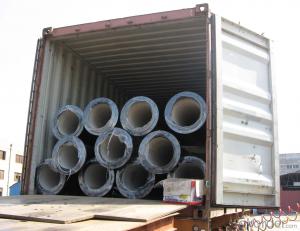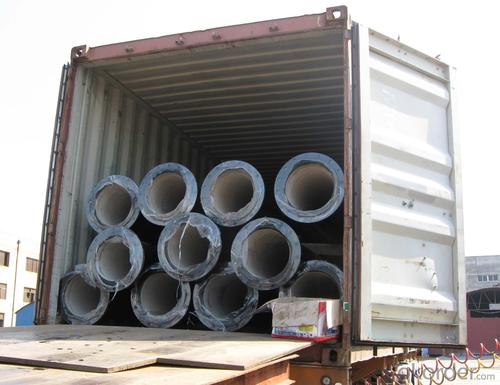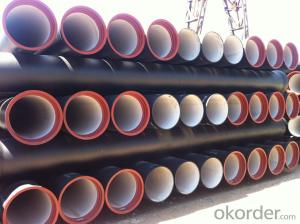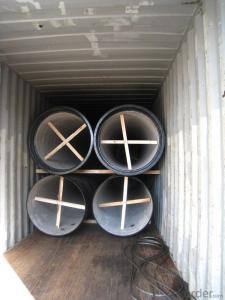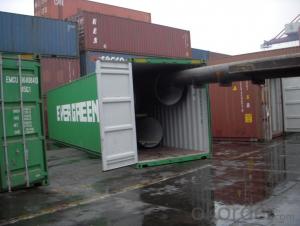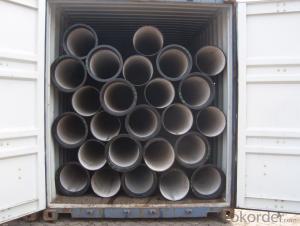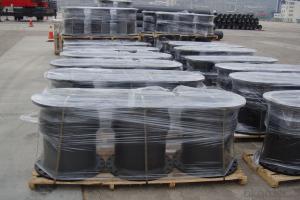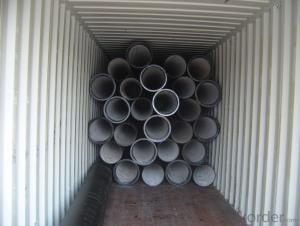DUCTILE IRON PIPES AND PIPE FITTINGS K8 CLASS DN1600
- Loading Port:
- Tianjin
- Payment Terms:
- TT OR LC
- Min Order Qty:
- 22 pc
- Supply Capability:
- 3000 pc/month
OKorder Service Pledge
OKorder Financial Service
You Might Also Like
Material : Ductile Cast Iron
Size Range : DN 80mm to DN 2000mm
Unit Effective Length : 6m or 5.7m
Manufacture Standard: ISO 2531:1998/ EN 545:2006/EN 598:2007
Annual capacity : 200,000 tons
Coating Exterior: Zinc 130g/m2 according to ISO 8179-1 and bitumen coating 70 microns.
Cement Interior: Portland Cement/ High Alumina Cement/ Sulphate Resisting Cement Lining according to ISO 4179
Special requirements on external coating and internal lining can be applied
We also provide accessories such as SBR/EPDM rubber gaskets, lubricant paste, pipe caps, PE sleeves, etc.
Additional Parts:
Each pipe is strictly inspected according to related standard to ensure permanently high performance.
Easy Installation at site and service free for life
Long Service Lifespan
Quotation will arrive you within 24hours once we get your inquiry.
We guarantee offering you a competitive price.
A copy of original inspection reports of pipes will be offered after shipment.
Photos of loading process will be sent to the customer after shipment effect.
We will follow-up the delivery progress after shipment effect and update to the customer on weekly basis.
- Q: What is the expected joint deflection capability of ductile iron pipes?
- The expected joint deflection capability of ductile iron pipes can vary depending on several factors. However, in general, ductile iron pipes have a higher joint deflection capability compared to other types of pipes. The joint deflection capability refers to the ability of a pipe joint to accommodate angular deflection or misalignment during installation or due to ground movement. Ductile iron pipes are known for their flexibility, which allows them to withstand external forces and movements without compromising their structural integrity. The expected joint deflection capability of ductile iron pipes typically ranges from 1 to 5 degrees, depending on the pipe diameter and wall thickness. This means that the pipes can safely accommodate angular deflection within this range without causing leakage or failure. It is important to note that the joint deflection capability can also be influenced by factors such as the type and quality of the joint restraint system, soil conditions, installation techniques, and pipe alignment. Proper installation practices and adherence to manufacturer guidelines are crucial in ensuring optimal joint deflection capability. Overall, ductile iron pipes are designed and manufactured to have a significant joint deflection capability, making them suitable for a wide range of applications, including water distribution, sewer systems, and industrial piping networks.
- Q: How do ductile iron pipes perform in cold weather conditions?
- Ductile iron pipes perform well in cold weather conditions due to their exceptional strength and durability. Unlike other materials, ductile iron pipes have a high resistance to freeze-thaw cycles, preventing them from cracking or breaking in freezing temperatures. Additionally, the material's flexibility allows for minimal expansion and contraction, ensuring stability even in extreme cold. Overall, ductile iron pipes are a reliable choice for cold weather environments.
- Q: Can ductile iron pipes be used for both water and wastewater applications?
- Ductile iron pipes are versatile and can be utilized in both water and wastewater settings. Their durability, strength, and corrosion resistance make them appropriate for various purposes such as water distribution, sewage systems, and wastewater treatment plants. These pipes are specifically engineered to endure high pressure and effectively manage the flow of both water and wastewater. Furthermore, ductile iron pipes possess a lengthy lifespan, minimizing the necessity for frequent replacements and maintenance. This attribute renders them a cost-effective alternative for both water and wastewater applications.
- Q: What are the typical surge anticipation measures for ductile iron pipe?
- To mitigate potential damage caused by surges or water hammer in ductile iron pipe systems, various techniques can be employed. These measures aim to absorb or redirect sudden pressure changes, preventing pipe rupture or failure. Common surge anticipation measures for ductile iron pipe include: 1. Incorporating air chambers strategically along the pipeline to create a cushion of air that absorbs surge energy. As the pressure wave travels through the pipe, the air compresses, reducing the impact on the pipe and minimizing the risk of damage. 2. Connecting surge tanks, which act as storage reservoirs for excess pressure, to the pipeline. When a surge occurs, the surge tank absorbs the excess water volume, preventing damage to the pipe. The stored water is gradually released back into the system, stabilizing the pressure. 3. Installing surge relief valves in the pipeline to automatically release excess pressure during surge events. These valves open when the pressure exceeds a preset limit, allowing the surge to dissipate harmlessly. Surge relief valves can be adjusted to release the desired amount of pressure, ensuring the safety of the ductile iron pipe. 4. Utilizing water hammer arrestors, which are devices that absorb the shock generated by surges and water hammer. These devices consist of sealed chambers filled with a compressible gas or liquid that absorbs sudden pressure changes. By absorbing the energy, water hammer arrestors protect the ductile iron pipe from potential damage. 5. Using surge suppressors, devices that regulate the flow of water during surge events. Surge suppressors are designed to reduce the speed at which surges travel through the pipe, minimizing the impact on the system. These devices can be installed at critical points in the pipeline to prevent damage to the ductile iron pipe. To determine the most suitable surge anticipation measures for ductile iron pipe installations, it is important to consider the specific requirements of the pipeline system and consult experienced engineers or industry professionals.
- Q: What is the use of ductile iron?
- Manufacturer of automotive diesel engines are starting from the prolong engine life, particularly cautious about expressing selection of crankshaft material, when the isothermal bainitic ductile iron and high strength in order to increase the power to weight ratio, expand the turbocharger use influence design according to the material, equipped with exhaust turbocharger tube the temperature is increased to 500 to 70. C, in this condition, the oxidation and creep strength become important. Ductile iron, with good properties, is being used instead of gray iron for the exhaust pipe and will further use silicon aluminum alloy ductile iron as the temperature increases.
- Q: Are ductile iron pipes suitable for acidic or alkaline environments?
- Ductile iron pipes can be used in both acidic and alkaline environments, but their performance may vary depending on the conditions. Ductile iron is a type of cast iron that has been strengthened and made more flexible by adding a small amount of magnesium. This treatment allows the pipes to withstand various conditions, including those found in acidic or alkaline environments. In acidic environments, ductile iron pipes resist corrosion well. The iron in the pipes reacts with the acid to create a protective layer of iron oxide, which prevents further corrosion. However, it is important to consider factors like acid concentration and temperature, as they can affect the performance of ductile iron pipes in acidic environments. In highly concentrated or extremely acidic conditions, materials like stainless steel or corrosion-resistant alloys may be more suitable. Similarly, ductile iron pipes also resist corrosion in alkaline environments. The alkaline conditions help to passivate the iron surface, forming a protective layer that prevents further corrosion. However, the specific conditions and alkali concentrations may influence the performance of ductile iron pipes in alkaline environments. In cases of very high alkalinity or extreme temperatures, materials like plastic or concrete pipes may be more appropriate. It is important to note that regular maintenance and monitoring are necessary to ensure the long-term performance of ductile iron pipes in both acidic and alkaline environments. Monitoring the pH levels and other chemical characteristics of the environment is crucial to identify any potential issues or required maintenance. Consulting experts or engineers in the field can provide valuable insights and guidance in selecting the most suitable materials for specific acidic or alkaline environments.
- Q: Can ductile iron pipes be used in gravity sewer systems?
- Ductile iron pipes find great utility in gravity sewer systems. Renowned for their robustness and durability, they are extensively employed in diverse applications, including sewer systems. Boasting exceptional corrosion resistance, they can withstand immense pressure and heavy burdens. Moreover, their flawlessly smooth interior surface curtails friction and enhances the transportation of waste and wastewater. Consequently, they emerge as an ideal option for gravity sewer systems, where the seamless flow of sewage hinges upon gravity to traverse the pipes.
- Q: A tube is used only in ductile iron pipes, isn't it?
- Compared with the PE pipe, from the installation time, ductile pipe PE pipe installation is simple and rapid, and after the installation of internal and external pressure bearing better tightness and corrosion resistance; from the point of view, ductile pipe sealing better after installation, but also can improve the corrosion resistance of corrosion protection through a variety of means; from the hydraulic performance, because ductile pipe specifications generally refers to the inner diameter of PE pipe diameter specifications generally refers to the same specifications, because under the condition of ductile pipe can achieve greater runoff; from the installation and maintenance cost, ductile pipe have more favorable price. The main components of ductile iron pipes are carbon, silicon, manganese, sulfur, phosphorus and magnesium. The inner wall of zinc spray, anti-corrosion materials such as cement mortar.
- Q: Are there any special considerations for installing ductile iron pipe in rocky soils?
- Installing ductile iron pipe in rocky soils presents various special considerations. First and foremost, the excavation process can be a challenge due to the presence of rocks. Trenching becomes more difficult and time-consuming, requiring specialized equipment to break through the rocks and create a suitable trench for the pipe installation. Furthermore, the rocky soil can cause abrasion and damage to the outer surface of the ductile iron pipe during installation. This poses a potential risk to the integrity of the pipe, leading to leaks or breakages in the future. To mitigate this risk, it is advisable to utilize protective measures such as rock shields or padding around the pipe, minimizing direct contact with the rocks. In addition, the presence of rocks can impact the backfilling process. Proper backfilling is essential to provide support and stability to the installed pipe. However, rocks can hinder the proper compaction of the backfill material, resulting in uneven support and potential movement of the pipe. Therefore, it is crucial to carefully select and place the backfill material, ensuring it is free from larger rocks and adequately compacted to provide sufficient support. Moreover, the rocky soil can also affect the installation of fittings and joints. The hardness of the rocks can make it challenging to align and connect the pipe with fittings or create secure joints. Therefore, extra care must be taken during the installation process to ensure proper alignment and secure connections, preventing leaks and ensuring the long-term functionality of the ductile iron pipe system. In conclusion, installing ductile iron pipe in rocky soils demands special attention to overcome challenges related to excavation, abrasion, backfilling, and fitting installation. By taking these factors into account and implementing appropriate measures, the installation process can be carried out successfully, allowing the pipe system to operate effectively even in rocky soil conditions.
- Q: How many casting methods are there in ductile iron casting? A 60*6 discus can not have sand holes. Its surface is smooth. What process can be used to make it?
- This is such a small piece, do not worry about shrinkage, mainly pay attention to sand hole and slag. With Disa wet molding line, a box of more pieces, suitable for mass production, defects will be relatively less. By using other methods (resin sand coated sand, etc.) can also be the main attention, don't type it, then the level of liquidity and relatively ductile iron, gray iron poor, sand and gas can not go up, sand holes or pores will spread in the discus plane.
Send your message to us
DUCTILE IRON PIPES AND PIPE FITTINGS K8 CLASS DN1600
- Loading Port:
- Tianjin
- Payment Terms:
- TT OR LC
- Min Order Qty:
- 22 pc
- Supply Capability:
- 3000 pc/month
OKorder Service Pledge
OKorder Financial Service
Similar products
Hot products
Hot Searches
Related keywords
